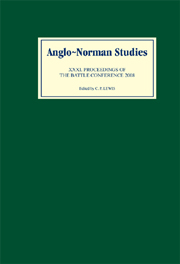Book contents
- Frontmatter
- Contents
- LIST OF ILLUSTRATIONS, MAPS, AND TABLES
- EDITOR'S PREFACE
- ABBREVIATIONS
- Kingship, Lordship, and Community in Eleventh-Century England (R. Allen Brown Memorial Lecture)
- Citadels of God: Monasteries, Violence, and the Struggle for Power in Northern England, 1135–1154
- Writing Civil War in Henry of Huntingdon's Historia Anglorum
- Land, Family, and Depredation: The Case of St Benet of Holme's Manor of Little Melton
- Brothers at Court: Urse de Abetot and Robert Dispenser
- Gerald of Wales and the Prophet Merlin
- The First Hundred Years of the Abbey of Tiron: Institutionalizing the Reform of the Forest Hermits
- All Roads Lead to Chartres: The House of Blois, the Papacy, and the Anglo-Norman Succession of 1135
- The Vita Ædwardi: The Politics of Poetry at Wilton Abbey
- William of Malmesbury, King Henry I, and the Gesta Regum Anglorum
- Twelfth-Century Receptions of a Text: Anglo-Norman Historians and Hegesippus
- LIST OF CONTENTS OF VOLUMES 1–30
Land, Family, and Depredation: The Case of St Benet of Holme's Manor of Little Melton
Published online by Cambridge University Press: 12 September 2012
- Frontmatter
- Contents
- LIST OF ILLUSTRATIONS, MAPS, AND TABLES
- EDITOR'S PREFACE
- ABBREVIATIONS
- Kingship, Lordship, and Community in Eleventh-Century England (R. Allen Brown Memorial Lecture)
- Citadels of God: Monasteries, Violence, and the Struggle for Power in Northern England, 1135–1154
- Writing Civil War in Henry of Huntingdon's Historia Anglorum
- Land, Family, and Depredation: The Case of St Benet of Holme's Manor of Little Melton
- Brothers at Court: Urse de Abetot and Robert Dispenser
- Gerald of Wales and the Prophet Merlin
- The First Hundred Years of the Abbey of Tiron: Institutionalizing the Reform of the Forest Hermits
- All Roads Lead to Chartres: The House of Blois, the Papacy, and the Anglo-Norman Succession of 1135
- The Vita Ædwardi: The Politics of Poetry at Wilton Abbey
- William of Malmesbury, King Henry I, and the Gesta Regum Anglorum
- Twelfth-Century Receptions of a Text: Anglo-Norman Historians and Hegesippus
- LIST OF CONTENTS OF VOLUMES 1–30
Summary
The effect of Norman lordship on English landholding at the local level is a well established theme in the historiography of the Norman Conquest. In recent years historians have tended to argue for elements of continuity across the Conquest, a notable example being David Bates's paper at the Spoleto Conference about the ‘feudal revolution’. It is now clearer than ever that the Normans arrived in a country which was already changing. Their role in speeding and directing change should not be underestimated, but, equally, the Normans should not be seen merely as predators, depriving native society as a whole of its privileges and rights. One particular example is Little Melton in Norfolk, supposedly taken by a Norman family from the abbey of St Benet of Holme. The case of Little Melton has been known to generations of scholars and students because it was chosen by Dorothy Whitelock to illustrate the theme of depredation in the second volume of English Historical Documents in 1956. By considering some other documents from St Benet's, however, we can see that the story is really rather different.
Little Melton lies ten miles west of Norwich and was a manor of the Norfolk Benedictine abbey of St Benet of Holme from the eleventh century until the sixteenth. Dorothy Whitelock chose five documents concerning Little Melton for the section of English Historical Documents about ‘land and people’.
- Type
- Chapter
- Information
- Anglo-Norman Studies 31Proceedings of the Battle Conference 2008, pp. 49 - 63Publisher: Boydell & BrewerPrint publication year: 2009



